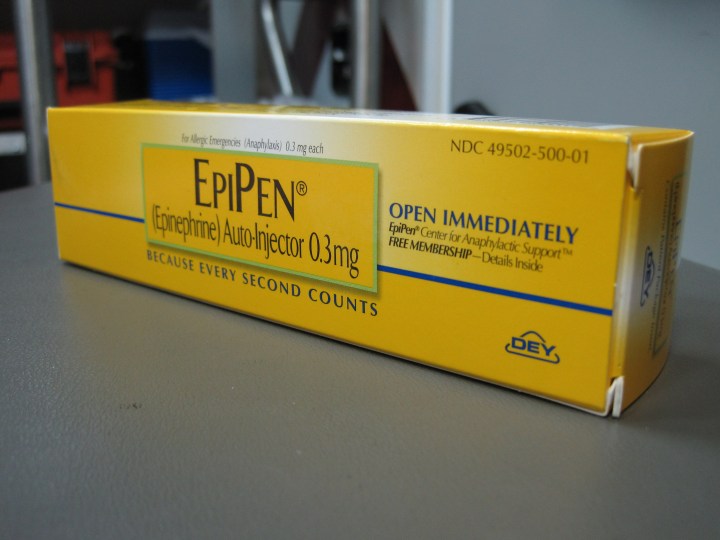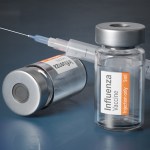SPOTLIGHT
EpiPens in short supply in South Africa, placing lives at risk

Epinephrine auto-injectors, often known by the commercial name EpiPen, can be lifesavers for people who suffer from severe allergic reactions. However, the treatments are expensive and difficult to find in South Africa.
Mariaan Schoeman was away from her Johannesburg home when she was stung by a bee and found herself struggling to breathe. She received emergency assistance for the unexpected allergic reaction, but when she tried to find an auto-injector for possible future attacks, it took her weeks and visits to multiple pharmacies in several cities to locate one.
“I just don’t understand why it is so hard to find,” she says. “So many people told me they just gave up. All of these people could potentially die.”
Esti Linder from George has faced similar challenges. She has become accustomed to checking every pharmacy she visits for the potentially life-saving product for her five-year-old son. She says she has not bought one in years because the devices she has found either have short shelf lives or are not available in a dosage appropriate for children.
“Beyond the problem of availability is the additional issue with cost. It is expensive,” Linder says. “For such a life-saving tool, to not be able to find any or afford any is absolutely ridiculous.”
A lifesaver
While allergic reactions differ in severity and form and might respond to antihistamines or other medicines, adrenaline in the form of an epinephrine auto-injector is one of the best first-line treatments for severe allergic reactions (anaphylaxis).
In South Africa, it is a schedule 4 medicine, meaning that it must be prescribed by a healthcare practitioner, including emergency care providers. It cannot be dispensed over the counter without a prescription.
Ahmed Bayat, COO of the Independent Community Pharmacy Association, explains that while the exact number of people who require this treatment in South Africa is unclear, the demand from those who do need it is high.
Yuven Gounden, spokesperson for the South African Health Products Regulatory Authority (Sahphra), confirms that the only two epinephrine auto-injector products approved as medicines in South Africa are the Mylan EpiPen, registered in 1993, and Mylan’s EpiPen Junior, registered in 2006.
While epinephrine is the first-line treatment for anaphylaxis, there are several other treatments registered that are supportive, such as oxygen and beta-agonists, to help patients breathe. Sahphra is also currently processing three cortisone products, which are supportive therapy to control abnormal immune responses after an anaphylactic episode is resolved.
Khadija Jamaloodien, Director of Affordable Medicines at the National Department of Health, confirms that there are contracts for adult and junior epinephrine auto-pens running until April 2024. “At present, we are not experiencing supply constraints for these items,” she says.
A company spokesperson for Viatris (Mylan is part of Viatris) told Spotlight that they take distribution of the auto-injectors very seriously and continuously monitor supply and demand in the country.
“We currently have stock of EpiPen and EpiPen Jr Auto-Injectors in the market,” the spokesperson said. “Due to the dynamic nature of demand, there may be temporary supply constraints of stock at times.”
The company also says that they engage with various stakeholders, such as government and manufacturers, to minimise supply disruptions.
Availability issues
Doctors in both the public and private sector, however, indicate that not being able to find auto-injectors is a regular, ongoing problem for people in South Africa.
Bayat says, “I know that there have been periods when there were shortages and they were in short supply across the whole supply chain from manufacturer to distributors and wholesalers and then finally to pharmacies.” He suspects that the problems are partly logistical around the length and difficulty of the importation process.
Prof Debbie White, Paediatric Pulmonologist at Charlotte Maxeke Johannesburg Academic Hospital, says she has not been able to access the pens, despite efforts to make them available.
Dr Marinda McDonald, a GP specialising in allergies in Johannesburg, says the vast majority of her patients have been able to access the pens, but that this may be because of her particular clientele and her efforts in finding stock.
McDonald calls the supply erratic and completely inconsistent, often coming down to luck.
“Mylan is not forthcoming with help or support at all,” she says, and suspects that the country receives the product in irregular batches instead of a rolling supply.
“There’s always a point where we can only get EpiPens that are three months expired.” She says that while larger pharmacy chains are dependent on certain distributors, smaller providers can sometimes find the product through smaller distributors.
Prof Michael Levin, head of the paediatric allergy division at Red Cross Children’s Hospital and CEO of the Allergy Foundation of South Africa, says that while he does have access and distributes the pens regularly, he knows his clinic is unusual in this regard.
Expensive and fragile
The difficulties in finding these products stocked in pharmacies are further exacerbated by the prices and expiration dates.
The Master Health Product List of 2022 quotes an EpiPen at around R740, with Bayat saying a pharmacy can charge a maximum of around R1,157.
If patients are members of a medical aid, their devices may be covered as a prescribed minimum benefit, meaning that the costs are covered out of the risk portion of the plan.
Mylan made headlines in the United States in 2016 when they hiked the price of the EpiPen — but South Africa has been shielded from similarly dramatic price hikes since medicines price increases here are strictly regulated.
Even so, White says that EpiPen prices are “extremely expensive and unaffordable for most of our patients”. She also notes that most patients ideally require several products: for instance, one at home and one at work or with a secondary caregiver.
Currently, only double-pack Epipens are available in the country, which fulfils this need but increases the price. The double-pack does also at times come with a “trainer”, which is a dummy device that can be used to teach others how to use it.
McDonald says, “What I can say is the fact that there’s only a sole supplier and one product in the country does reduce the imperative of the company to compete in a cost-effective manner.”
If patients do find EpiPens, which ideally are not used regularly, the products might expire in four or five months and then have to be returned to a pharmacy to be discarded safely.
“Adrenaline by nature is very fragile,” Bayat says, explaining that it is sensitive to both light and temperature.
One form of relief that has been implemented is a Stock Protection Letter, which is given if the EpiPen has less than 11 months to its expiration date and means that it can be replaced at no cost to the patient. The letter is meant to be issued to the pharmacy or doctor by Mylan, though several of the experts Spotlight spoke to said they had not experienced this process being fully completed yet.
Alternatives
While the EpiPen product is arguably the international leader in this field, there are a few alternatives, such as the Anapen, which McDonald says has been in the country in the past.
Local startup Impulse Biomed has a reloadable device in development that would allow for the needle and casing to be reused if the epinephrine has expired before being used, making the device cheaper. While there is no definite date yet for their product, called the ZiBiPen, to go to market, media coverage around a recent investment into the company projects a possible launch in 2023.
Levin was involved with the original idea and explains that the first iterations were meant to include variable doses and needle lengths depending on the particular patient, but that this was quite difficult to achieve technically.
White explains that at Charlotte Maxeke Hospital, they give patients emergency kits that contain a vial of adrenaline and a syringe with a clearly written action plan on when and how to use it in the correct dose.
“It is obviously harder to administer than an EpiPen and requires good caregiver education, but serves as a valuable and more affordable alternative,” says White.
This option, while difficult and potentially dangerous, is often the best one at hand, and is dramatically cheaper than an EpiPen. Where possible, practitioners ease the process by pre-filling a syringe.
Future steps
While some of those who need this life-saving product have found ways to protect themselves, the situation is clearly far from ideal.
“Ideally another product on the market would be great as this would hopefully bring the price down and make this life-saving medication more affordable to all,” says White.
“I would like to see a substantial improvement in the availability and the longevity of the devices,” says Levin, “whether that’s through improved distribution with Mylan with existing products, or whether it’s through the registration of additional products in the country.”
McDonald also calls for greater additional training of healthcare professionals around allergies. “If we have a scarce resource, then you shouldn’t prescribe an EpiPen if there’s not an indication for it. It’s not a security blanket.”
Furthermore, Levin says, “I would like an exception to be made with Sahphra for the need for named patient basis for the prescription of adrenaline auto-injectors to allow schools and other places where people at risk are likely to congregate, to be able to have undesignated EpiPens.” DM/MC
This article was published by Spotlight — health journalism in the public interest.




















I’ve yet to understand why medicines that are approved in markets by trusted regulators cannot be automatically approved for the local market. There must be very few exceptions such as our local HIV/AIDS and TB epidemics that would need special attention. This would stop the artificial scarcity that is boosting prices. As usual, who suffers the most…
Its interesting how the manufacturer/owner ahs managed to block the the sale of any generic competitor here